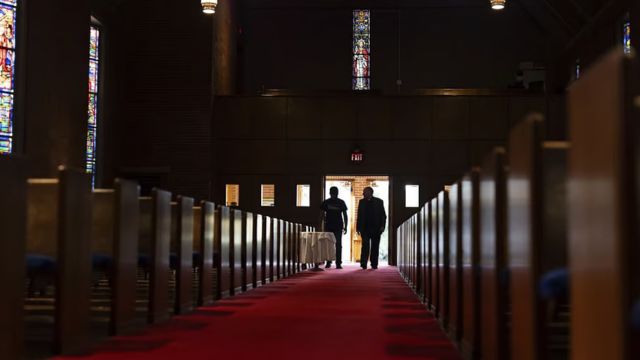A new study says that up to four out of five immigrants who are at risk of being deported from the United States are Christians. It asks Christians to think about how the Trump administration’s harsh deportation policies affect their faith.
The study says that about 10 million Christians could be deported and that 7 million Christian U.S. citizens live in homes where someone could be deported.
The report, which was put together by big Catholic and evangelical groups, uses a lot of different kinds of data. It includes the percentages of religious affiliation in different groups of migrants and people from other countries, as well as an advocacy group’s analysis of U.S. census data on migrants.
“We’re deeply worried about fellow Christians, but we’re not just worried about immigrants who share our faith,” said Matthew Soerens, vice president of advocacy and policy at World Relief, an evangelical humanitarian group that helped fund the study.
Soerens said in a video statement, “As Christians, we believe that all people, no matter what religion they follow or where they are from, are made in God’s image and have inherent worth.” But he also said that a lot of Christians in the U.S. might not know that most of the people who could be sent back to their home country are also Christians.
The National Association of Evangelicals, the U.S. Conference of Catholic Bishops’ Committee on Migration, and the Center for the Study of Global Christianity at Massachusetts’s Gordon-Conwell Theological Seminary were some of the other groups that helped make the study. The report doesn’t take a political stance; its major goal is to make Christians more aware of the problem. Some of the groups that funded it have also pushed for changes that would allow some types of immigrants to become legal residents.
People who crossed the border illegally or who may have some kind of legal standing that could be taken away are both at risk of being deported. The Trump administration has taken steps to end temporarily protected status, which many people from Venezuela and Haiti had, as well as humanitarian parole, which had been given to other people from those troubled countries and Cuba and Nicaragua.
In all three of his campaigns, President Donald Trump had a lot of backing from Christian groups. A large poll of more than 120,000 people by AP VoteCast found that he had the support of about 8 out of 10 white evangelical Christians, 6 out of 10 white Catholics, and just over half of Latino evangelicals in 2024.
The study doesn’t talk about that support directly, but it does say that it wants to make people more aware of how Trump’s crackdown on immigration could affect people.
People might not go to public places like church services even if they are afraid of being deported. Walter Kim, president of the National Association of Evangelicals, said that many Christian refugees have helped churches get back on their feet and grow in a time when more and more people in the U.S. don’t belong to any religion.
Kim said, “They come from places around the world where the church is really doing well.” “Not only are they bringing that strong faith to America and making a difference, but they are also making the church stronger in America.”
Kim said that sending a lot of people away would be the same as the government supporting a “church decline strategy.”
Kim said that his group has long pushed for changes that would separate violent offenders from “the much larger share of immigrants who are contributing to our communities and to our churches, and who are serious and eager” to stay in the country.
A lot of research has shown that foreigners are less likely to commit violent crimes than people who were born in the United States.
Bishop Mark Seitz, chair of the bishops’ conference’s Committee on Migration, said that the latest report said that more than half of all people in the United States who could be deported are Catholic.
Seitz said it was possible that the deportations would split up families.
“We know what it means to break up a family and the terrible threats that people face when they are quickly sent back to their home countries, which they left because of the terrible threats they faced there,” said Seitz, who is in charge of the Diocese of El Paso, Texas.
Seitz said that they are in danger in their home countries because of bad government and organized crime.
“People will die if this work to deport people keeps up at this rate,” he said.
Based on immigrants’ self-reported memberships, the report’s methods included finding out how many Catholics, evangelicals, and other Christian groups there were in the countries where they came from. The study then used those percentages to look at groups of immigrants from different types of immigration.
There are a lot of ideas that go into these kinds of methods, but a lot of the places where a lot of immigrants and refugees come from, like Latin America, sub-Saharan Africa, and Ukraine, have a lot of Christians.









